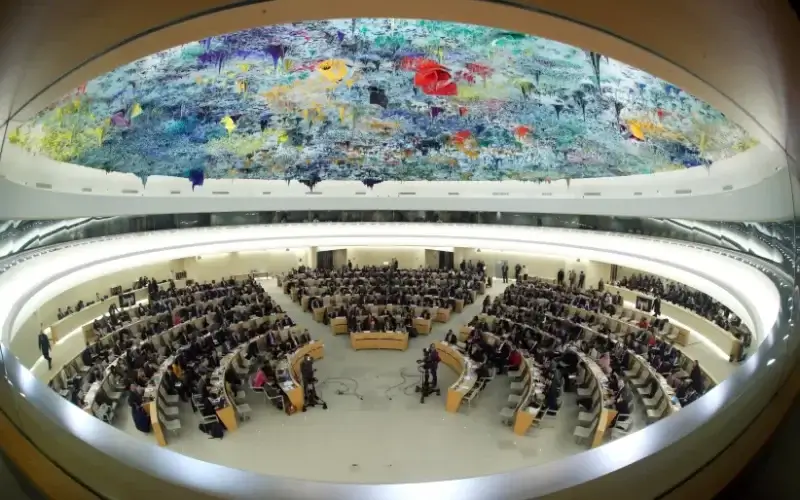The United Nations Human Rights Council approved four anti-Israel and pro-Palestinian resolutions, including a call for a limited arms embargo against the Jewish state, as it wrapped up its 49th session.
Israel was the only country the UNHRC censured multiple times. Russia, which is a UNHRC member, was censured only once for its invasion of Ukraine, with a resolution that passed 32-2, with 13 abstentions.
Other countries – North Korea, Iran, Belarus, Myanmar, Nicaragua, and Syria – were taken to task for human rights abuses with only one resolution per country.
Israel is not a voting member of the UNHRC but spoke multiple times about UNHRC bias during the voting process on Friday and Thursday.
When it comes to Israel, Ambassador Meirav Eilon-Shahar said, the council was an “echo chamber of fantasy and hatred against Israel.
“The problem with this echo chamber is that no reality comes in but certainly the hatred seeps out,” she said.
Out of the four resolution texts, the “accountability” resolution which spoke of the arms embargo is considered to be the most contentious. It was approved by the UNHRC in a 37-3 vote, with seven abstentions.
The three countries that stood with Israel were: Brazil, Malawi, and the United States, which rejoined the council as a voting member this year.
US Ambassador to the UN Michele Taylor said that the Biden administration was “disappointed that [UNHRC] member States continue to disproportionately single out Israel and are dismayed by the many repetitive and one-sided resolutions that run year after year.”
The countries that abstained from the vote on accountability were: Cameron, Honduras, India, the Marshall Islands, Nepal, Ukraine and the United Kingdom.
All the European Union countries on the council supported the text, including France and Germany.
It urged “all states to refrain from transferring arms when... they assess that there is a clear risk that such arms might be used to commit or facilitate serious violations or abuses of international human rights law or serious violations of international humanitarian law.”
Last year, the resolution passed 32-6, with eight abstentions. The shift in the voting pattern had to do with changes to the rotating membership of the 47-member body and was not reflective of shifts in the positions of individual countries.
The Palestinian Ambassador to the UN in Geneva Ibrahim Khraishi said that it was important to hold Israel accountable for its actions against his people.
“This draft resolution should ensure justice and should hold to account all those who violate international humanitarian law and… to provide reparation and compensation to the [Palestinian] loved one of the victims,"
The other three resolutions were voted on under Agenda Item 7. The UNHRC is mandated to debate alleged Israeli human rights violations at each session. No such requirement is leveled against any other of the UN’s 193 member states.
Israel and the United States have worked unsuccessfully to abolish Agenda Item 7. That the three Agenda Item 7 votes took place on “April Fool’s Day,” underscored for Israel’s mission to the UNHRC in Geneva the absurdity of the Agenda Item.
As an April Fool’s joke, it tweeted that the Agenda item had been abolished. “Ensuring human rights is not a joke. But Item 7 is. It is not about human rights. It is only a relic of a darker past. A relic whose only goal is to demonize Israel.
“Today, on #AprilsFools, it is time for #HRC49 to embrace reality and oppose Item 7,” the mission wrote.
Of the three Agenda Item 7 resolutions, the one condemning Israeli settlement activity and calling for a boycott of settlement products and an Israeli withdrawal to the pre-1967 lines was approved 38-4, with five abstentions.
Those who stood with Israel were: Malawi, the Marshall Islands, the United Kingdom and the United States. Those who abstained were: Brazil, Cameron, Honduras, Lithuania and Ukraine. Last year the same text passed 36-3, with eight abstentions.
The resolution on the rights of the Palestinian people to self-determination was approved 41-3, with three abstentions.
Those who stood with Israel were: the Marshall Islands, the United Kingdom and the United States. Those who abstained were: Cameron, Honduras and Lithuania. Last year, it passed, 42-3, with two abstentions.
Those who opposed or abstained from the text were not making a statement against Palestinian sovereignty, but wanted to take a stand against the council’s anti-Israel bias.
The resolution with the least amount of support was the text that asked Israel to withdraw from the Golan Heights, which was approved 29-15, with three abstentions.
Those who stood with Israel were: Finland, France, Germany, Japan, Lithuania, Luxembourg, Malawi, the Marshall Islands, Montenegro, Netherlands, Poland, Korea, Ukraine, the United Kingdom and the United States.
Those who abstained were: Brazil, Cameroon and Honduras.
Khraishi defended the continued presence of Agenda Item 7.
The focus should be on ending Israel’s “occupation” and not the debate about it, Khraishi said, as he accused Israel of “colonialism and apartheid.” Earlier in the session, the special investigator into alleged Israeli human rights abuses submitted a report in which he accused Israel of the crime of apartheid.
Taylor said that “the continued existence of this agenda item calls into question the credibility of this body. None of the world’s worst human rights violators, some of whom are the subject of resolutions at this session, have their own stand-alone agenda item at this Council. Only Israel receives such treatment.
“Further, we strongly reject the characterization voiced by some that Israel’s actions constitute apartheid,” Taylor added.










